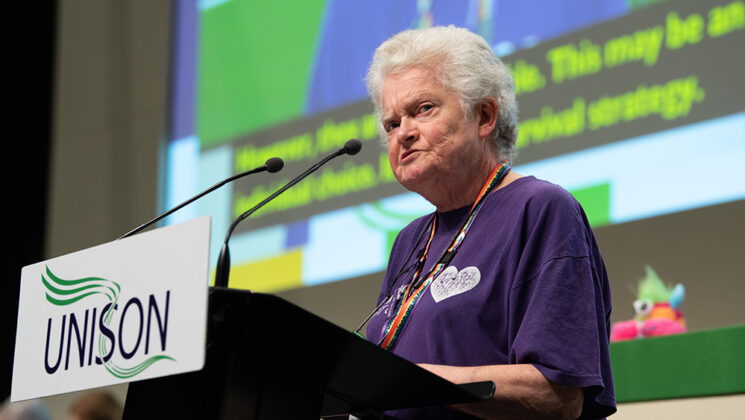The final afternoon of the UNISON’s 2023 local government conference saw several motions on social care passed.
The session, chaired by UNISON president Andrea Egan, kicked off with a motion on a national care service.
Tony Barnsley, introducing the motion on behalf of the NJC local government committee, said: “The pandemic shone a light on social care for a lot of people in this country.
“On the one hand, we saw minimum-waged heroes putting themselves on the frontline, to care, despite lack of PPE. On the other hand were owners of these privatised care homes, demanding more money from the state.
“It is vital UNISON sends a message loud and clear to this government: you can’t fix free market failure in the care sector with more free market policies. Fixing market failure requires the state to step back in, take control, and run care for the needs of the many, not profits for the few.
“Insourcing, insourcing, insourcing is the solution to market failure.
“We need a national care service established in this country, with the same political vigour and principles that the NHS was created with.”
Mr Barnsley encouraged delegates to read UNISON’s bargaining for insourcing guide.
Council-provided care
However, a second motion, introduced by Brenda Aitchison on behalf of Scotland, outlined the perils of a national care service that is not run by councils.
In a motion titled ‘council-provided care’, Ms Aitchison explained how, in Scotland, UNISON has opposed the current National Care Service (Scotland) Bill, in part because it is “an attack on local government and the local government social care staff”.
The bill will take social care services out of the control of councils and placed in the hands of care boards. Ms Aitchison said: “If this bill is passed, it will remove democratic control from all councils in Scotland.
“We know we need a national care service. We know change is needed, but that change has to be right for both staff and the service users. Our current system promotes the market approach, which drives down standards of pay and conditions. We need to say loudly – we need to take profit out of care.”
Speaking in support of the motion on behalf of the service group executive, Lorraine Thompson said: “The quality of care provided by the council will nearly always be better than the private sector, primarily because the profit motive does not impede on service provision.”
Caring for our carers
A third motion centred on the need to care for social carers themselves. Introducing a motion on behalf of UNISON’s national women’s committee, Sarah Feeney said: “80% of people working in care are women. A greater proportion are Black women. And they’re treated appallingly.”
Speaking in support of the motion, Valerie Bossman-Quarshie from UNISON Barnet said: “In my experience as a young carer, I did not have enough support, I was paid low wages, working long hours, but I do remember loving those I cared for, and that love has not changed or left me.”
“We must remember young carers, those who haven’t even registered as carers, and those from African and African-Caribbean, Black backgrounds, caring for our ageing population. It’s a good thing we are ageing and living longer, but we should celebrate those young carers when there’s no incentive for becoming a carer.”
Adult social care
A final motion passed on adult social care was introduced by the national LGBT+ committee with Jackie Lewis (pictured) moving.
Ms Lewis told delegates: “There is roughly a 50/50 split in the number of adults receiving adult social care, between those who are retired and those who are working age.
“There will be a significant number of people who are or will be users of adult social care who are LGBT+ local government workers.
“Anecdotal evidence suggests that LGBT+ workers are – and have always been – well-represented among social care workers. However, they are often invisible.
“A workforce where LGBT+ workers are unable to be out at work is not likely to be one where workers can confidently meet the specific needs of LGBT+ service users.”








